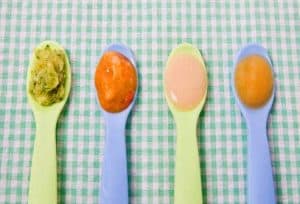Nutritional requirement of children are much higher than as compared to adults because they have to grow from an average weight of 3kg of birth to over 50kg at adolescence and they spend a lot of energy in their day to day activity.
For Example- Daily caloric requirement during infancy is about 120kcal/kg compared to 40kcal/kg in adults!
Milk is a complete food and exclusive breast feeding is able to maintain normal growth of children during first 4-6 months of life. After this, infant must be gradually weaned off (changed over) to take semi-liquid or semi-solid food otherwise his weight gain will slow down and he will develop nutritional deficiencies.
Must read: Food for your 6-8 Month old Baby
Weaning is the most crucial phase of child nutritional and demands considerable time, effort and ingenuity on the part of mother for its success. Effort should be made to give home-made nutritious weaning foods with utmost care by maintenance of personal hygiene (and home sanitation) to prevent risk of bacterial contamination.
Some must read articles
A to Z of teething(Problem and its Cure)
28 Iron Rich Food for babies/toddlers/kids proper devlopment
29 Home remedies to cure Constipation in babies&kids
Lentil Soup(Dal pani) for our 6 month old Baby
Depending upon the source of water supply, you may have to filter the water or boil it before use. Unless strict hygienic precaution are taken, weaning phase may be associated with occurrence of frequent infections especially diarrhea and dysentery.
After 6 months
After 6 months beast feeding should be continued but child offered gradually increasing amounts of semisolid or finely mashed weaning foods.
It is useful to acquire a hand blender or mixer at this stage to thoroughly mash and blend the semi- solid food.
Breast feeding should be continued as long as feasible but for a minimum period of 1 year. Two to three breast feeds can be continued up to 2 years.
Small small tips that are very useful when you start giving food withbreast-feeding
- Start with a precooked cereal, often 2-3 teaspoonfuls in a clean bowl with a baby spoon. Prepare it properly in a thinner, non-sticky and smooth consistency by constantly stirring with a spoon to prevent formation of lumps.
- You can prepare thin porridge or kheer made from cereals like Suzi, ground rice or wheat flour with water or milk.
- Offer the semi-liquid food when baby is wide awake, hungry and in good mood. Give small amounts and gradually increase the quantity.
- The breast feeding can be given afterward if baby wants and accept it.
- It is amazing how discriminatory and choosy many young babies are. They first taste the new food before deciding whether to accept and swallow it or reject it.
- Like adults, children have likes and dislikes for various foods, some prefer sweet food and other like saltish; some take it blend while other relish strong flavors.
- Initially , many babies produce usual sucking movements of the tongue )which they are used to for swallowing milk) giving the impression as if baby is rejecting the food.
- You should have patience and perseverance , and gradually your baby would learn and start enjoying semi-solid food.
- By 6 months most babies can coordinate swallowing and biting movements.
- At this stage babies loved to eat a mashed banana. Mash the banana with a spoon or fork in a bowl and feed with a small spoon. Gradually increase the quantity of banana, till at the end of 2-3 weeks he/she is able to eat a whole banana.
- You can start with two semi-liquid meals (morning and evening) and gradually increase the quantity and frequency.
- Many mothers are keen to give fruit juices to their baby. Fruit juices are time consuming to prepare and are associated with potential risk of bacterial contamination.
- Fruit juices do not have outstanding nutritional virtues but provide sugars, vitamins,minerals and antioxidants. It is much better to offer mashed or stewed or pureed whole fruit to the child rather than fruit juices.
- Tinned fruit juices and fresh fruit juice procured from market or road side vendors should be strictly avoided specially for babies.
- Home -prepared fresh juice is useful to relieve constipation. You can give 2-3 teaspoon of orange,sweet lime(masumbi) or keenoo juice to relieve constipation.
- Most children enjoy and love to take fruit juice. When a child has loose stools or diarrhea , fruit juice should not be given.
Hope you get some idea about the food habits of 6 to 8 months babies. To get regular updates please subscribe to my blog and my face book page.
ref : The art and science of baby and child care by Dr. Meharban Singh






